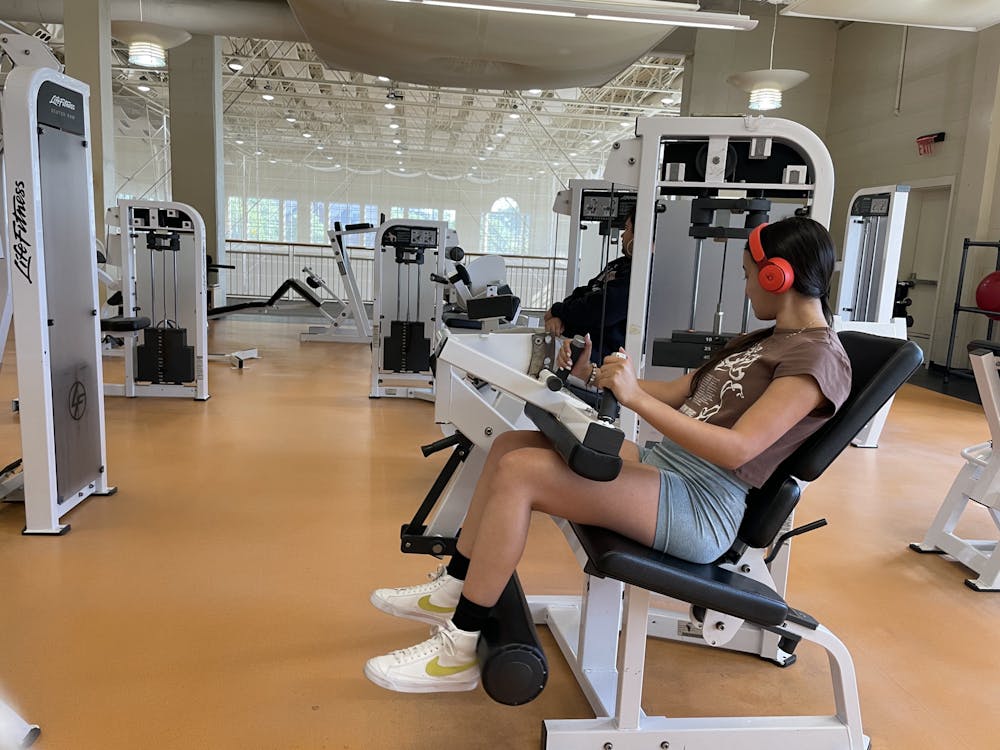Mercer University’s dress code was first implemented in April 2004, back when Mercer still had official ties to the Georgia Baptist Convention. Today, students and gym-goers are held to this dress code by Bear Force employees in the University Center Fitness Center during all operating hours. The dress code has stayed consistent since its debut, but some students feel that it is outdated and not equally enforced.
According to the dress code, all students are required to avoid wearing “shirts that are manufactured or altered to expose the abdominal area.” This language has been interpreted to include cropped shirts, sports bras and side-cut muscle shirts.
One student, Anna Strupp ‘26, said that she was "dress coded," or called out by employees for not following the dress code, by Mercer for wearing a crop top within the first week of her freshman year.
“It really hit home when it happened to me as, you know, an autonomous adult. It really sat me down and I was like, 'Wow, this institution that I've been so excited to come to is letting me down after the first week.' I guess that moment is what felt so isolating for me,” Strupp said.
Another student, Fiona Cole ‘26 said that she has also been dress-coded multiple times by Bear Force and feels that the dress code is unnecessary.
“I just think it's sexist because we should be able to wear what we want to the gym. I've been a dancer my whole life and I'm so used to just wearing whatever and showing my body. I just think it's unnecessary because it's only covering, like, an inch or two of skin,” Cole said.
Both Cole and Strupp said that the dress code seemed to be inconsistently enforced between men and women, as well as during different hours of the day. They believe this is because the workers of Bear Force feel uncomfortable having to dress code their peers.
“I do see that it's inconsistently reinforced. And I think that comes down to the fact that (Bear Force) workers don't want to dress code people. I can tell most of them really don't,” Strupp said.
When speaking with Michael Junod, Director of the University Center, and Adrian Collier, Associate Director of the University Center, they both said that they recognize it can be uncomfortable having members of the Bear Force enforce the dress code on their peers.
“We are not in the business to embarrass you,” Collier said.
Collier states that Bear Force employees attend training sessions on how to interact with a student breaking the dress code. Bear Force members are encouraged to bring the student away from their friends in order to avoid embarrassment and try to educate them on the dress code, as opposed to calling them out publicly and accusing them. According to Collier and Junod, Bear Force members are also required to only pull aside students of the same sex: females should speak to females and males should speak to males.
The dress code mostly applies to covering the upper body, allowing students to wear shorts, but not expose their midriff.
“If there's going to be a dress code, it needs to be enforced equally. And it should not target the midriff. That is the thing that they have an issue with. I've never been dress coded for my back showing or for my legs showing, things like that, that aren't sexualized or a sign of modesty,” Strupp said.
Additionally, students using the machines are required to wipe them down after each use, and Bear Force wipes them down regularly, as well. When asked about how they believe covering the upper body and not the lower body is effective in preventing sweat on machines that focus on the lower body, Junod states that the solution is not to completely eliminate skin-to-skin contact but rather to reduce sweat as much as possible.
“Using proper hygiene around the machines helps keep everyone safe,” Junod said.
Strupp disagreed. “I just don't think that there's really a need for a dress code that prohibits people from wearing crop tops," she said. "With the amount that they're wiping down the machines, there should be no issues with it in regards to sweat… I think that part is unfair because it's so clearly an attack on women. But they don't want to say that or they can't say that. So I think in that aspect, it's sexist.”
Many of the women and feminine-presenting students who attend the gym that have been dress coded for exposing their midriffs have expressed feeling degraded, uncomfortable and discriminated against when they are called out.
“I feel like it's not progressive at all. It just ultimately makes me feel uncomfortable knowing that someone is actively watching and scanning the room,” Cole said.
Students who feel the dress code is improper are calling for Junod and Collier to listen to their stories and understand why they feel the dress code is not being equally enforced between men and women.
“Those individuals have probably not faced any sort of gender-based discrimination. So it is harder for them to understand. I think it also just makes me a little bit more hesitant to really try to speak with someone at the top, because of that lack of representation of women,” Strupp said.
When asked for a response to this, Collier said that “the goal is not to target any specific person or group, but enforce the policies for all.” Students may decide this is a dismissive or a closed-minded response to their concerns, while others may feel that their intentions are well-placed.
If you have an experience related to the gym dress code you would like to share, please fill out this form.





